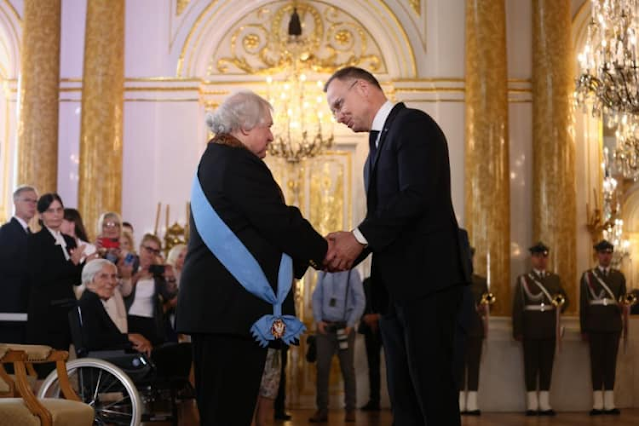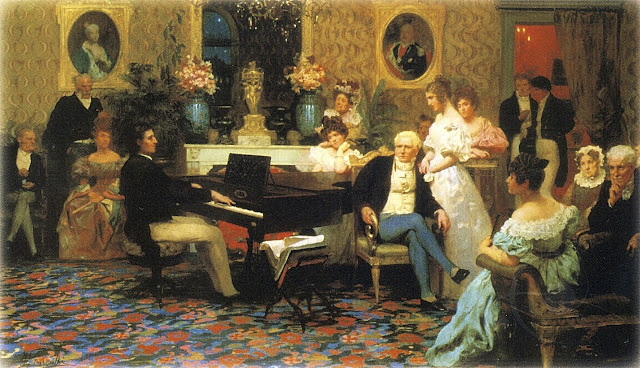Jerzy Maksymiuk, the outstanding Polish conductor, composer and pianist, was today awarded the honour of the Order of the White Eagle, National Day 3rd May 2024
"The President of the Republic of Poland, Andrzej Duda, during today's ceremony of awarding state medals on the occasion of the National Day of the Third of May at the Royal Castle in Warsaw, awarded Jerzy Maksymiuk, an outstanding conductor, composer and pianist, with the Order of the White Eagle.
Established in 1705, the Order of the White Eagle is the oldest and highest state medal of the Republic of Poland.
On this remarkable day, I would like to express my heartfelt congratulations - on behalf of myself and the countless admirers of your extraordinary talent, creativity and unparalleled artistic personality!
Congratulations on this well-deserved award and thank you for all the deep musical emotions you have given us."
* * * * * * * * * * * *
Here is a review of Maksymiuk I wrote of a concert given as part of the 2012 Chopin i jego Europa Festival
And so to the final concert in this excellent series. Anticipation was high and the hall looked to be full. The evening began with La Mer by Debussy. For me this has always been one of the greatest French symphonic works of the twentieth century – the impressionist orchestration is sublime, the Far Eastern timbres, opening in my mind pictures of ‘The Great Wave’ by Hokusai and the South Pacific island where I lived for many years in my youth (Norfolk Island about a thousand miles off the east coast of Australia – home of the descendants of the Mutiny on the Bounty).
Dimitri Alexeev (piano)
Sinfonia Varsovia conducted by Jerzy Maksymiuk
Dimitri Alexeev performed the Ravel Piano Concerto in D major for the left hand. He is a great pianist and virtuoso. This astonishing work, at times revelling in its own grotequeries, was written to a commission from Paul Wittgenstein (1887-1961), an Austrian pianist who had his right arm amputated during the Great War. He was the brother of great logical positivist philosopher Ludwig Wittgenstein. The family were highly cultured with regular visits from great such musical figures as Mahler, Brahms and Richard Strauss. Many of the twentieth century’s finest composers wrote works for him (although he did not perform them all) and he evolved all sorts of remarkable techniques of pianistic and sound illusion previously considered impossible for one hand. His is a remarkable story.
As encores Alexeev played a Gershwin Prelude followed by an extraordinary virtuosic arrangement of Polish folk songs – no-one I spoke to afterwards had a clue who transcribed them but a real showpiece and great fun! Was the transcription by Aleksander Tansman?
* * * * * * * * * * *
(A little history - Extracted from A Country in the Moon, Michael Moran, London 2008)
Catherine
the Great, once the lover of King Stanisław Augustus, had greatly influenced
his election to the Polish throne and was now increasingly pulling the strings
of policy.
‘It must be true that love in a sovereign is quickly replaced by ambition, for that same Catherine soon destroyed her own work, and overthrew the monarch she had so carefully protected.’
(The Memoirs of Elizabeth-Louise Vigée-le
Brun trans. Siân Evans,
Stanisław
Augustus was a man of high artistic refinement and sensibility who preferred
the company of women, spoke six languages fluently, read widely in the French philosophes and did not drink. He
wholeheartedly embraced the Enlightenment and catalysed a cultural renewal in
Poland. This polished cosmopolitan ‘upstart’ was unlikely to find much favour
among the xenophobic, hard-drinking, hard-riding Sarmatian poorer szlachta who espoused a growing
revolutionary patriotic cause. ‘He was certainly no hero, but behind the
languid frivolity lurked a strong sense of purpose and love of his country…..’
In 1772 Jean-Jacques Rousseau published Considérations
sur le gouvernement de la Pologne. He advised the Poles with great prescience ‘If you
cannot prevent your enemies from swallowing you whole, at least you must do
what you can to prevent them from digesting you.’
The French Revolution was sending ripples along the Vistula as far as Warsaw. A major indigestible fragment of Poland for Russia was the Constitution of the Third of May 1791, the first written constitution in Europe.
King Stanisław Augustus
was triumphantly carried shoulder high through the streets of the capital upon
its proclamation. Based on Enlightenment principles, it created an hereditary
monarchy, reformed the government and limited the powers of the szlachta. The day of May 3rd is a public
holiday in Poland marked by military parades, folk dancing, re-enactments of
the King’s proclamation by actors in the forecourt of the Palace on the Island
in Łazienki Park.
In
response Catherine massed her troops and precipitated a year long war. In 1793
the defeated Poles were forced to rescind the constitution, Prussia and Russia consumed
more of the country and the Second Partition came into being.
In 1795 the country was completely wiped from the map of Europe by the final partition ‘lying as if broken-backed on the public highway; a nation anarchic every fibre of it, and under the feet and hoofs of travelling neighbours’
(History
of Frederick II of
But not forever. One can argue that Poland would not exist as an independent member country of the European Union today if these so-called ‘heroic failures’ and bloody insurrections had not taken place. As Marshall Piłsudski once remarked in a succinct expression of Polishness ‘Victory is to be defeated but not to surrender’.





A lovely little blog post - and it's good to see you're so active in the life of Poland and its music! I'm currently reading 'A Country in the Moon' - it's a marvellous book that I will be recommending to my friends as soon as I finish it.
ReplyDelete